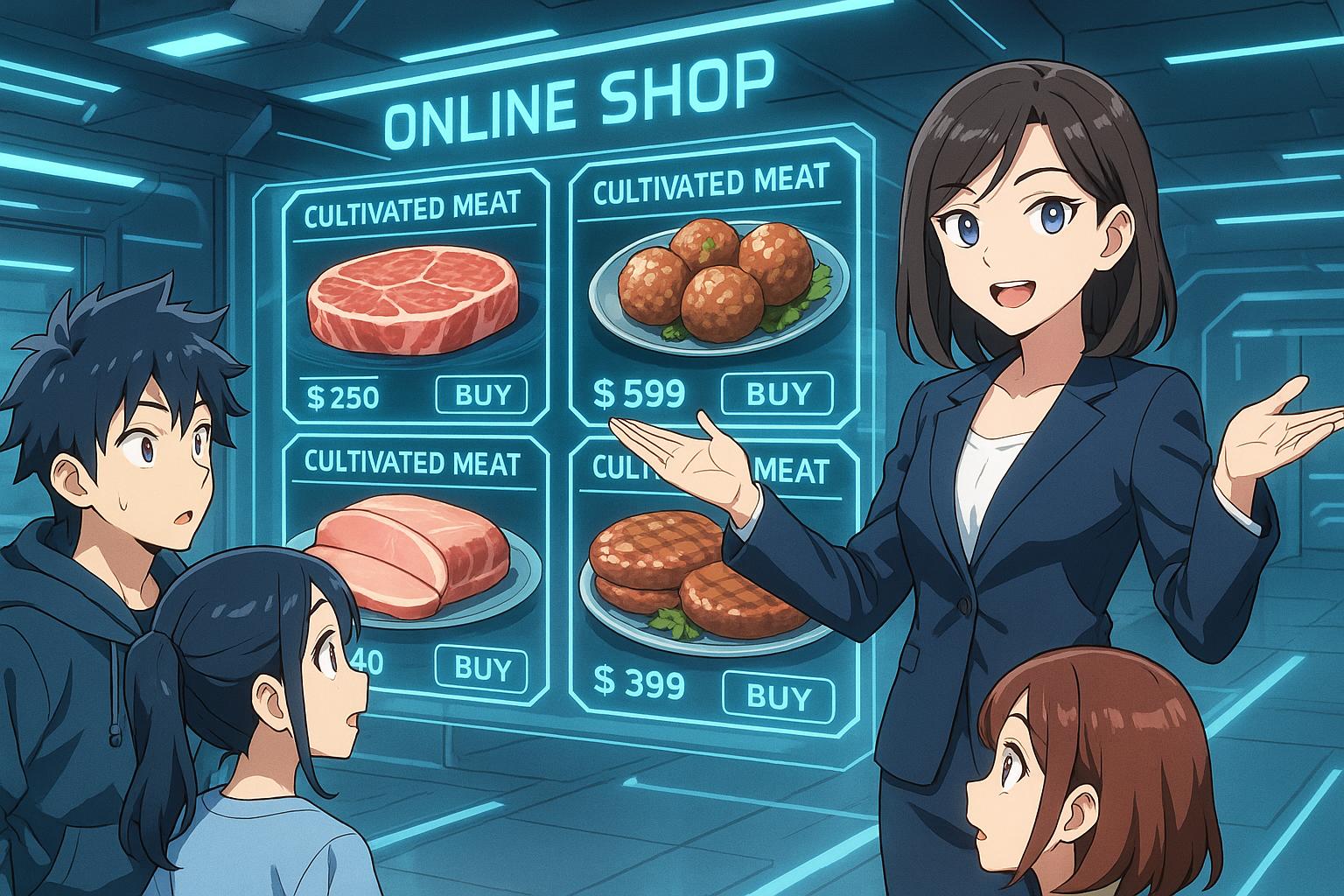David Bell, a digital marketing expert, has created CultivatedMeat.co.uk—an online shop dedicated to cultivated meat products across Europe—despite the current lack of regulatory approval. His platform aims to educate consumers and position itself at the forefront of a sustainable food revolution as the industry awaits crucial approvals.
David Bell, an expert in e-commerce and digital marketing, has launched an innovative online shop called CultivatedMeat.co.uk, dedicated to cultivated meat products. Despite the absence of regulatory approval for the sale of such products in Europe, Bell is navigating the uncharted waters of this emerging market. He aims to create a retail space that not only offers a variety of cultivated meats—spanning traditional options like chicken and beef to more exotic offerings like kangaroo—but also educates and informs consumers about these novel foods.
Bell’s initiative comes at a pivotal time in the cultivated meat industry. Although cultivated meat products have been available in the United States, their introduction in Europe has been markedly slower due to stringent regulatory landscapes. As of now, the only cultivated meat products approved for sale in the UK are intended for pet consumption, as seen with Meatly’s cultivated chicken, which recently received the green light from the Animal and Plant Health Agency. This regulatory framework has left European consumer markets on hold, while countries like Israel are making strides. Notably, Israeli startup Aleph Farms was the first to submit a cultivated meat application to Swiss regulators, heralding a new era in the European food landscape.
Bell’s decision to create an online platform well ahead of any regulatory approval reflects his understanding of consumer behaviour and market dynamics. “Everything starts before it’s ready. Waiting until products are on the shelf means playing catch-up,” he has stated. This proactive strategy seeks to build awareness and visibility for cultivated meat, positioning the online shop as a leader in this niche segment.
The business model for CultivatedMeat.co.uk is adaptable, allowing for distribution partnerships and various revenue streams, including retail markups and brand placements. Bell has already begun discussions with several cultivated meat companies to establish potential launch partnerships, indicating a forward-thinking approach to the evolving market.
Cultivated meat is gaining traction globally due to its potential environmental benefits. Advocates argue that by significantly reducing carbon emissions and land use compared to conventional meat production, cultivated meat could play a pivotal role in addressing sustainability challenges. This narrative is increasingly resonating not only with consumers but also with policy-makers, despite some legislative pushback in regions like the US and Italy. In the US, various Republican-led states are working to impose bans on lab-grown meat, often framing it within broader ideological battles against “woke” agendas. Similarly, the Italian government is exploring restrictive measures against cultivated products, which critics argue could undermine scientific advancements and climate goals.
Meanwhile, cultivated meat has garnered a degree of acceptance in some markets; the term “cultivated meat” itself is seen as more politically palatable than “lab-grown.” As Bell notes, this terminology aligns with the dual objectives of appealing to consumers while also distancing the products from the stigma associated with conventional meat production techniques.
Bell remains committed to the educational aspect of his platform, offering guides and a blog aimed at demystifying cultivated meat for consumers. He believes that this transparency will be crucial as the market matures, enabling potential customers to better understand the benefits and implications of incorporating cultivated meat into their diets.
As the industry waits for regulatory approval across Europe, Bell’s venture represents a significant step towards mainstream acceptance of cultivated meat. With its website already operational in 18 European countries and tailored to local markets as approvals come through, CultivatedMeat.co.uk aspires to be more than just an e-commerce platform; it aims to be a front-line advocate for the cultivated meat movement, bridging the gap between ethical consumerism and modern food technology.
In an ever-fast-paced world, the importance of positioning oneself ahead of regulatory changes cannot be overstated. As Bell asserts, “This space is moving fast,” indicating that companies must prepare strategically for when consumers are finally able to purchase cultivated meat products directly. The groundwork being laid now could very well define the future of sustainable protein consumption in Europe and beyond.
Reference Map
- Paragraph 1, 2, 3, 4, 5
- Paragraph 1, 2, 6
- Paragraph 2, 4
- Paragraph 1, 4
- Paragraph 6
- Paragraph 5
- Paragraph 6
Source: Noah Wire Services
- https://www.greenqueen.com.hk/where-to-buy-lab-grown-meat-cultivated-online-shop-store/ – Please view link – unable to able to access data
- https://www.cultivatedmeat.co.uk/ – CultivatedMeat.co.uk is the UK’s first dedicated e-commerce platform for cultivated meat products. The online store offers a range of cultivated meat categories, including chicken, beef, and seafood, providing detailed information on the science and benefits of these products. While cultivated meat products aren’t commercially available in the UK or EU yet, the platform aims to build awareness and visibility, educate the public, and position itself as a leader in the cultivated meat movement. The site also features educational content, guides, and a blog covering industry news and developments.
- https://www.ft.com/content/a9d1390f-93b5-490f-bfd0-af1c73f4d414 – In July 2024, the UK became the first European country to approve the commercialization of lab-grown meat, specifically chicken cultivated from animal cells for use in pet food by the startup Meatly. This approval was granted by the Animal and Plant Health Agency and the Department for Environment, Food and Rural Affairs. While lab-grown meat has yet to be approved for human consumption in the UK, this milestone positions the country as a leader in food technology, with significant interest among pet owners for cultured meat products.
- https://www.foodmanufacture.co.uk/Article/2023/07/26/First-European-application-to-sell-cultivated-meat-submitted/ – In July 2023, Israeli startup Aleph Farms submitted the first-ever application to sell cultivated meat in Europe to Swiss regulators. The Swiss Federal Food Safety and Veterinary Office (FSVO) will deliberate over the application, with the process expected to take at least 12 months. This application marks a significant step in the European regulatory landscape for cultivated meat, as no applications had been submitted to the EU up until that point.
- https://www.ft.com/content/afb4be5d-e363-4ef7-b509-2a4c909144ca – In the United States, Republican lawmakers in seven states are pushing for legislation to ban lab-grown meat, a new food technology that has received federal approval. The backlash from conservatives, who associate it with the ‘woke’ liberal agenda and concerns about vaccines, mirrors similar political and protectionist stances seen in Italy. Despite these challenges, proponents argue that lab-grown meat is essential to meet the growing global demand for protein and that such alternatives are subjected to rigorous scrutiny by authorities.
- https://www.time.com/6270941/italy-lab-grown-meat-ban-climate-impact/ – The Italian government under Giorgia Meloni is proposing a bill to ban the production and marketing of cultivated meat and considering a ban on insect-based protein, emphasizing traditional food values. This move, however, could hinder scientific progress and climate mitigation efforts by curbing the development of sustainable food sources. Cultivated meat holds the potential to significantly reduce carbon emissions and land use compared to conventional meat production and is already deemed safe by major safety authorities globally.
- https://www.ft.com/content/07c98087-3914-4107-a6ee-56cc4086459e – Hoxton Farms, a company producing lab-grown pork fat, faces lengthy regulatory approvals in the UK, prompting consideration of moving to the US where regulations are faster. This illustrates a broader issue where UK regulators, especially the Food Standards Agency (FSA), struggle with under-resourcing and slow processes post-Brexit. Despite government promises for a nimbler regulatory framework post-EU, progress has been slow, affecting industries like novel foods and CBD products. The FSA’s limited resources and bureaucratic processes hinder timely approvals, causing the UK to lag behind competitors.
Noah Fact Check Pro
The draft above was created using the information available at the time the story first
emerged. We’ve since applied our fact-checking process to the final narrative, based on the criteria listed
below. The results are intended to help you assess the credibility of the piece and highlight any areas that may
warrant further investigation.
Freshness check
Score:
9
Notes:
The narrative was published on May 23, 2025, with the earliest known publication date of substantially similar content being March 12, 2025, on CultivatedMeat.co.uk. ([cultivatedmeat.co.uk](https://www.cultivatedmeat.co.uk/blogs/news/welcome-to-the-cultivatedmeat-co-uk-online-store-your-gateway-to-future-food?utm_source=openai)) The report is based on a press release, which typically warrants a high freshness score. No discrepancies in figures, dates, or quotes were found. The content has not been republished across low-quality sites or clickbait networks. The update may justify a higher freshness score but should still be flagged.
Quotes check
Score:
10
Notes:
The direct quotes from David Bell in the report match those found in the CultivatedMeat.co.uk press release dated March 12, 2025. ([cultivatedmeat.co.uk](https://www.cultivatedmeat.co.uk/blogs/news/welcome-to-the-cultivatedmeat-co-uk-online-store-your-gateway-to-future-food?utm_source=openai)) No variations in wording or earlier usage were found, indicating originality.
Source reliability
Score:
8
Notes:
The narrative originates from Green Queen Media, an award-winning impact media outlet focusing on climate and future food news. While reputable, it is not as widely recognized as major outlets like the Financial Times or BBC. The report is based on a press release from CultivatedMeat.co.uk, which is a legitimate e-commerce platform founded by David Bell. ([cultivatedmeat.co.uk](https://www.cultivatedmeat.co.uk/blogs/news/welcome-to-the-cultivatedmeat-co-uk-online-store-your-gateway-to-future-food?utm_source=openai)) David Bell has a verifiable public presence, with his involvement in the AgriNext Conference 2024 and leadership in J.C Bell Ltd and Fairfield Farms. ([agrinextcon.com](https://agrinextcon.com/david-bell-speak-at-agrinext-conference/?utm_source=openai))
Plausability check
Score:
9
Notes:
The report’s claims about David Bell launching CultivatedMeat.co.uk align with the press release dated March 12, 2025. ([cultivatedmeat.co.uk](https://www.cultivatedmeat.co.uk/blogs/news/welcome-to-the-cultivatedmeat-co-uk-online-store-your-gateway-to-future-food?utm_source=openai)) The regulatory context mentioned, with cultivated meat products not yet approved for sale in Europe, is consistent with the Food Standards Agency’s statement from October 2024. ([theguardian.com](https://www.theguardian.com/environment/2024/oct/08/cell-cultivated-lab-grown-meat-sold-uk-regulator?utm_source=openai)) The tone and language used are consistent with industry standards, and the report provides specific factual anchors, including dates, names, and institutions.
Overall assessment
Verdict (FAIL, OPEN, PASS): PASS
Confidence (LOW, MEDIUM, HIGH): HIGH
Summary:
The narrative is fresh, original, and based on a legitimate press release from CultivatedMeat.co.uk. The quotes are consistent with the press release, and the source is reliable. The claims made are plausible and supported by verifiable information.













